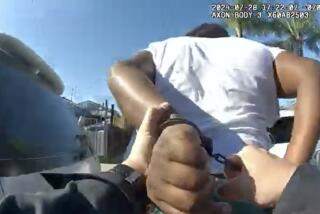Rockwell on Police Beating
- Share via
As a lawyer representing victims of police abuse, a member of the board of directors of the Police Misconduct Lawyers Referral Service and an avid student of Ludwig von Mises, I read with much interest Rockwell’s article on the police beating. Apparently, Rockwell concludes that beatings like that suffered by King are necessary to prevent crime. Given Rockwell’s position as president of the Ludwig von Mises Institute, his views imply that Ludwig von Mises subscribed to the conclusions and methodology espoused by Rockwell. I take great exception to Rockwell’s article, for reasons not the least of which is it besmirches the methodology and principles taught by the late Prof. Von Mises, in my opinion one of the premier economists and great minds of the 20th Century.
I was too young in the 1950s to appreciate the degree of police brutality that existed then, but I will accept Rockwell’s assertion that brutality was common then. However, his thesis--that police brutality then accounted for the lower crime rate in the 1950s--is unsupported. Surely a significant increase in crime rates since then is attributable to the ever-escalating “war on drugs” and other similar law enforcement policies enacted and enforced to prevent individuals from freely engaging in voluntary activities, e.g., drug use, gambling, prostitution. As any student of Von Mises should know, laws designed and enforced to prevent individuals from freely engaging in voluntary activities must be condemned on economic grounds. Not only do these laws deprive individuals of what they deem to be in their best interest, the cost of criminal enforcement is high.
Rockwell need not bemoan the passing of the practice of police beatings in the paddy wagon. That practice is alive and well and flourishing in our Southern California communities. Just ask Rodney King.
DONALD W. COOK
Los Angeles
More to Read
Sign up for Essential California
The most important California stories and recommendations in your inbox every morning.
You may occasionally receive promotional content from the Los Angeles Times.













